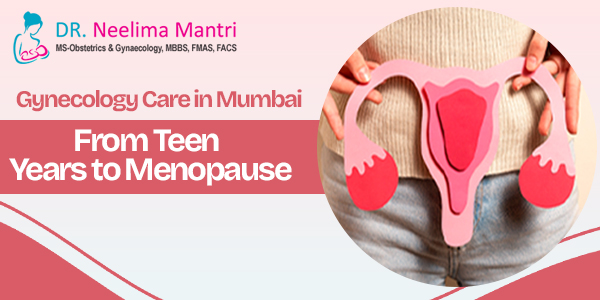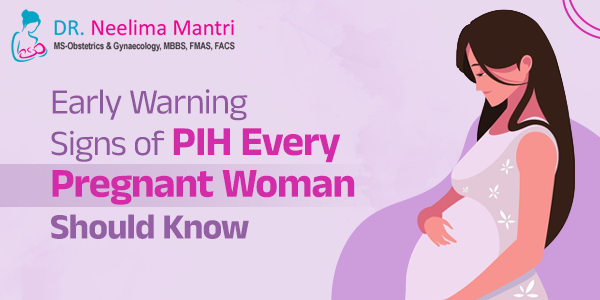
by Dr Neelima Mantri | Feb 20, 2026 | Blog, Gynecologist
Pregnancy brings joy mixed with worry when you want everything to go perfectly for nine months until your baby arrives safely. Choosing the right doctor matters tremendously because pregnancy care shapes outcomes for both mother and child through every stage. The best pregnancy care gynaecologist in Mumbai guides you through monthly checkups and watches for problems before they become emergencies. Your doctor becomes your partner during this journey, and picking someone experienced and attentive makes the entire experience less frightening.
Experience With Complex Cases Sets Top Doctors Apart
The best gynaecologist for pregnancy in Mumbai has managed thousands of pregnancies, including complicated cases that demanded quick thinking and expertise. Experience teaches doctors to spot warning signs early when problems first develop rather than waiting until situations become critical. Newer doctors might miss subtle symptoms that veterans recognise instantly from years of practice with diverse patients. This depth of knowledge protects you when unexpected complications arise during what seemed like a normal, healthy pregnancy.
High-risk pregnancies need specialists who understand conditions like gestational diabetes or preeclampsia that threaten both mothers and babies. A pregnancy care doctor in Mumbai with advanced training handles these situations calmly because they have guided similar patients through safely. Generic gynaecologists might refer you elsewhere when complications emerge, but specialists manage complex cases directly without disrupting your care. Continuity matters because switching doctors mid-pregnancy means starting over with someone unfamiliar with your history.
Personalised Attention Makes Pregnancy Less Stressful
The top pregnancy doctor in Mumbai takes time answering your questions rather than rushing through appointments to see more patients daily. Pregnancy raises countless worries, and having a doctor who listens without making you feel silly for asking matters emotionally. You need someone who explains test results clearly and discusses options thoroughly when decisions about your care arise. Feeling heard and respected by your doctor reduces the anxiety that naturally comes with carrying a baby for months.
Modern Facilities Support Better Outcomes When Emergencies Happen
Healthy pregnancies can become urgent at any moment, and the availability of great facilities is a decisive factor in the results of mothers. In case the gynaecologist in Mumbai is the best and the hospitals he works at have neonatal intensive care units and advanced surgical facilities. Distance matters during emergencies, so choosing a doctor near quality facilities you can reach quickly provides peace of mind. Labour progresses unpredictably, and having everything needed close by protects you when timing becomes absolutely crucial for safety.
Technology helps doctors monitor baby development and catch abnormalities earlier than older methods allowed just a few years back. Modern ultrasound equipment provides clearer images that reveal potential issues whilst babies still grow inside the womb safely. A pregnancy care specialist in Mumbai uses these tools routinely to track growth and ensure everything progresses normally month after month. Early detection of problems gives you more options and better chances of addressing concerns before birth complications arise.
High Risk Pregnancies Demand Specialised Expertise
Women over thirty-five or those with existing medical conditions need doctors specifically trained in managing high-risk situations carefully. The high-risk pregnancy doctor in Mumbai coordinates care between specialists when conditions like diabetes or heart problems complicate pregnancy. These situations demand monitoring beyond standard prenatal visits because risks increase for both mother and developing baby. Choosing someone experienced with your specific risk factors dramatically improves the chances of healthy outcomes despite challenges.
Previous pregnancy losses or complications make subsequent pregnancies emotionally difficult beyond just the physical medical concerns involved. Doctors experienced with high-risk cases understand the psychological toll and provide reassurance backed by careful monitoring throughout. This combination of technical skill and emotional support helps anxious mothers stay calm whilst receiving excellent medical attention. Specialist care costs more sometimes, but the investment protects your health and gives your baby the best possible start.
Pregnancy is a process that should be given professional care by a person who is not only a medical genius but also has a strong sense of empathy towards patients during this transformative period. Dr Neelima Mantri offers a wide range of pregnancy care, including regular checkups and complicated cases that need the attention of a specialist.

by Dr Neelima Mantri | Feb 11, 2026 | Blog, Female Gynaecologist
Women go through major body changes from their first period all the way through menopause decades later in life. Each phase brings different health questions and concerns that need a doctor who actually gets what you are dealing with right now. Finding the Best Gynecologist in Mumbai means picking someone who can walk beside you through every single stage without making you feel rushed or stupid. Too many women bounce between doctors for years before landing on one they trust enough to discuss embarrassing symptoms or fears openly.
Good care starts when you find a doctor who really listens instead of just nodding and writing prescriptions without explanations. Dr Neelima Gynecologist Mumbai treats women from their teenage years straight through pregnancy and into the rough transition that menopause brings. She gets that talking to a sixteen year old needs a totally different approach than counseling someone at forty trying to conceive. Sticking with one doctor who knows your whole history makes dealing with new problems less scary and way more manageable over time.
Health Needs During the Teenage Years
Teenage girls deal with confusing changes when periods start showing up and cramps knock them flat some months without warning. A Gynecologist for All Age Women in Mumbai talks to young patients without embarrassing them or acting like their concerns do not matter much. These early visits teach girls what counts as normal and what might need checking out before it turns into something worse. Learning about periods and basic hygiene now builds habits that protect health for the next fifty years and beyond that.
Periods that come randomly during the first couple years are pretty common but sometimes they point to hormone troubles worth treating now. Cramps bad enough to miss school might mean endometriosis or cysts that deserve attention instead of just toughing it out forever. Gynecologists can also field questions about body stuff that feels too weird to ask parents about when you are fifteen. Making these conversations feel safe helps girls grow into women who feel okay about their bodies instead of ashamed or confused.
Supporting Women Through Pregnancy Planning and Childbearing
The twenties and thirties bring questions about preventing pregnancy until you are ready and then figuring out how to conceive when the timing feels right. A Women’s Health Specialist in Mumbai helps you pick birth control that actually fits your life instead of forcing one method on everyone who walks in. Getting your body ready before trying to conceive catches vitamin gaps or health issues that might mess up conception or pregnancy later on. Couples who try for months without luck need someone to talk to about what tests make sense and what options exist beyond just waiting.
Pregnancy means checkups every few weeks to make sure both mom and baby stay healthy until delivery day finally gets here. Things like PCOS or fibroids need management during these years since they can block conception or cause miscarriages that break your heart. After birth your body needs time to heal but new moms often skip followups when they should be getting checked out too. Having the same doctor through all this means someone already knows your story when something new and worrying pops up out of nowhere.
Finding a Gynecologist You Can Trust Long Term
Looking for the Best Gynecologist Near Me in Mumbai should focus on training and whether the doctor actually treats all age groups well. You need someone who keeps learning new stuff instead of doing everything exactly how they were taught back in medical school.
Patient reviews tell you if the doctor listens and explains things or just rushes you out the door after five minutes flat. Gynecology Services in Mumbai work better when the office sits close enough that you will actually go for checkups instead of skipping them. Dr Neelima Gynecologist Mumbai mixes solid medical knowledge with a kind approach that makes even awkward conversations feel less awful and more productive for your health.

by Dr Neelima Mantri | Jan 21, 2026 | Blog, Gynecologist
Pregnancy changes the body in many ways. One of the most common questions women ask after giving birth is when their period will return. Some expect it to come back within weeks, while others may not see it for several months. Every experience is different. That is why understanding the timing and nature of your first period after delivery can help you prepare better for the postpartum phase.
When Do Periods Return After Pregnancy?
The return of menstruation after childbirth does not follow a set rule. It depends on how the body heals and whether the woman is breastfeeding. For some, the first period may arrive within six to eight weeks. For others, it may take longer.
Hormones play a large role in this timing. If you are not breastfeeding, your period may come back sooner. But if you are nursing, especially exclusively, your cycle may pause for several months. Many women wonder how long after delivery do periods return, but there is no fixed number. Every body works at its own pace.
How Breastfeeding Affects Periods After Delivery
Breastfeeding affects hormone levels. The hormone responsible for milk production, called prolactin, also delays ovulation. This is why many women do not get their periods while breastfeeding. However, it is still possible to ovulate and become pregnant even before the first postpartum period.
Hence, it is imperative to use protection [if you are not planning another pregnancy]. Periods after breastfeeding often return once feeding frequency drops or solid foods are introduced. This process can vary, so staying alert to changes in the body is always helpful.
What to Expect From Your First Period After Childbirth
The first period after childbirth may feel different from your pre-pregnancy cycle. It could be heavier, lighter, more painful, or completely irregular [as these changes are linked to hormone shifts and uterine recovery].
Postpartum periods may also bring more noticeable mood changes and fatigue. Some women report heavy flow or clots [especially during the first few cycles]. For women who had a caesarean, periods after C-section may also vary. Healing from surgery can affect the uterus and change the flow or timing for a few months.
When to See a Gynaecologist for Postpartum Period Problems
If your periods remain extremely heavy, painful, or irregular beyond a few cycles, it is best to speak to a doctor. You should also watch out for signs such as foul-smelling discharge, large clots, or sudden cramps [indicating infection or other complications]. When cycles do not return even after stopping breastfeeding for months, medical review is important.
Therefore, seeking assistance from a trusted Gynaecologist in Mumbai streamlines and manages such complications. Be sure to consult Dr Neelima Mantri for ongoing support during postpartum recovery and menstrual health.
Conclusion
The journey through postpartum recovery includes more than just feeding and rest. Understanding your period after pregnancy is an important part of staying in tune with your health. Some women get their period within weeks while others wait several months.
The return of menstruation after childbirth may bring some surprises [be it a vaginal delivery or a C-section]. Each cycle is your body’s way of returning to balance. By paying attention and seeking help when needed, you can make this transition smoother and more manageable.
by Dr Neelima Mantri | Jan 12, 2026 | News and Events
Dr. Neelima participated in the 53rd Annual Conference of the Mumbai Obstetric & Gynecological Society (MOGS), one of the most prestigious academic gatherings in the field of obstetrics and gynecology, held at the Jio World Convention Centre, Mumbai.
During the conference, Dr. Neelima was invited as a judge for a student scientific session, where she evaluated research presentations by postgraduate students and young doctors. Her role as a judge highlights her academic expertise, clinical experience, and dedication to maintaining high standards in medical education.
In addition, Dr. Neelima had the honor of awarding prizes to the session winners, recognizing and encouraging emerging talent in obstetrics and gynecology. Her presence and contribution reflect her continuous commitment to academic excellence, mentorship, and the advancement of women’s healthcare.
Participation in such national-level conferences allows Dr. Neelima to stay updated with the latest advancements in gynecology, contribute to professional knowledge sharing, and support the next generation of medical professionals.

by Dr Neelima Mantri | Jan 12, 2026 | Blog, Women Health Issues
Pregnancy is a significant development in every couple’s life. It brings joy along with unexpected complications. High blood pressure is one such complication that begins after the fifth month. This condition is called Pregnancy-Induced Hypertension [or PIH]. It often starts without warning and can affect both the mother and the baby. That is why it is important to understand how PIH begins and what early signs must not be ignored. Spotting the condition early often leads to safer outcomes for everyone involved.
What Is Pregnancy-Induced Hypertension (PIH)?
Pregnancy-Induced Hypertension is a condition where blood pressure rises after 20 weeks of gestation. It affects women who had normal blood pressure before pregnancy. The condition is different from chronic hypertension because it begins only after the pregnancy advances. If ignored, PIH may lead to complications involving the kidneys, liver and the placenta. In some cases, it may progress to preeclampsia or affect the growth of the baby.
Early Warning Signs of PIH You Should Not Ignore
The signs of PIH may not be obvious at first. Many symptoms may seem like routine discomforts of pregnancy. But certain changes must not be dismissed. The most common early warning signs of PIH in pregnancy include swelling in the face or hands, blurred vision and severe headaches. Other signs may include upper abdominal pain or sudden weight gain without changes in diet. Some women may also feel short of breath or pass less urine than usual.
Risk Factors That Increase the Chances of PIH
Not all women face the same risk of developing PIH. Some are more prone due to health conditions or previous pregnancy issues. Carrying twins or being over the age of 35 raises the chances. First-time mothers are also more likely to develop this condition.
Medical history plays a strong role. Women with diabetes along with kidney disease and autoimmune disorders are at higher risk. If a close family member has faced PIH in the past, then extra care is advised throughout the pregnancy.
When to Seek Medical Help for High Blood Pressure in Pregnancy
High blood pressure should never be ignored during pregnancy. Medical attention becomes necessary if your readings remain above 140/90 mmHg after 20 weeks. Knowing when to consult a gynaecologist for high BP can help prevent major complications.
Doctors may monitor your blood pressure and suggest extra tests to assess your kidney function, liver health and fetal growth. In some cases, pregnancy hypertension treatment may include rest along with medication and frequent follow-up visits.
Conclusion
The body often reacts before a condition becomes serious. Thus, early signs must be treated with care, not confusion. Some symptoms may seem harmless, but they might signal a larger concern. Ignoring them can delay important care and increase risk. Regular check-ups do help, but personal awareness plays an equal role in keeping pregnancy safe.
If you feel off or experience any change that does not feel normal, it is best to act early. Consulting a trusted Gynaecologist in Mumbai ensures you get the right advice without waiting too long. Dr. Neelima Mantri is widely regarded as the best female gynaecologist in Mumbai. She is known for her practical approach and ongoing guidance throughout pregnancy.
Learning about the complications of PIH helps you take control of your decisions. It prepares you to face issues with clarity instead of panic. Most women who act on time receive the care they need and go on to deliver safely. That is why awareness is not just helpful. It is essential for peace of mind.
Page 1 of 6212345...102030...»Last »








